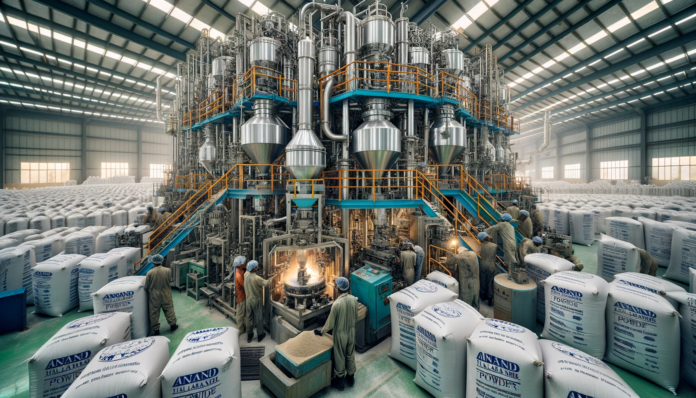Firebricks and insulation materials play a vital role in industries that deal with extreme heat. These materials are required to withstand high temperatures, protect machinery, and ensure the safety of workers. One of the most important components that significantly enhances the properties of these heat-resistant materials is Kyanite powder. This naturally occurring mineral not only increases the strength of firebricks but also boosts their thermal stability, making it essential for applications such as refractories and ceramics. In this article, we will explore the role of Kyanite powder in strengthening firebricks and insulation materials, focusing on its unique properties and industrial applications.
What is Kyanite?
Kyanite is a silicate mineral known for its excellent refractory properties. It is primarily composed of aluminum silicate (Al2SiO5) and belongs to the same family of minerals as andalusite and sillimanite. Kyanite is unique because of its ability to undergo a significant volume expansion when heated, a characteristic that makes it particularly useful in refractory applications.
When Kyanite is exposed to temperatures above 1300°C, it undergoes a transformation into mullite, an alumina-silicate mineral that exhibits exceptional thermal stability and resistance to chemical attack. This transformation is key to understanding how Kyanite powder exporter in India supplies a crucial ingredient for creating robust firebricks and insulation materials.
The Importance of Kyanite in Firebricks
Enhancing Durability
Firebricks must be durable enough to withstand high-temperature environments, such as furnaces, kilns, and fireplaces, where temperatures can easily exceed 1000°C. Kyanite powder acts as a strengthening agent in the production of firebricks, thanks to its expansion properties. When Kyanite converts into mullite, it fills the voids within the brick matrix, leading to a denser and more robust material that is less prone to cracking under thermal stress. This makes Kyanite-enriched firebricks much more durable than those made with conventional materials.
Thermal Shock Resistance
One of the greatest challenges for materials used in high-heat environments is thermal shock, the rapid temperature changes that cause materials to crack or fracture. The presence of Kyanite helps to mitigate this issue. During the heating process, the volume expansion of Kyanite creates a microstructure within the firebrick that can absorb and dissipate the stresses caused by sudden temperature changes. This property is crucial for industries that experience frequent heating and cooling cycles, such as metallurgy, cement manufacturing, and glass production.
The Role of Kyanite in Refractory Insulation
Lightweight and Efficient Insulation
In addition to strengthening firebricks, Kyanite in refractory products enhances the performance of insulation materials. Kyanite’s ability to expand when heated is beneficial in the manufacturing of lightweight refractory insulation. This expansion allows the material to maintain its integrity while reducing overall weight, which is a key consideration for industries seeking to minimize energy consumption and optimize thermal efficiency. Refractory insulation made with Kyanite powder can withstand extreme temperatures while providing excellent thermal insulation, reducing the need for frequent maintenance and replacements.
High Thermal Stability
Refractory insulation materials must retain their insulating properties even when exposed to prolonged high temperatures. Kyanite’s transformation into mullite provides exceptional thermal stability, ensuring that the insulation retains its structure and effectiveness over time. This stability is particularly important for industries like petrochemical plants and power generation facilities, where maintaining consistent thermal insulation is critical to operational efficiency and safety.
Kyanite in Ceramics: A Versatile Material
Beyond refractories, Kyanite in ceramics plays a significant role in enhancing the properties of various ceramic products. When used in ceramic manufacturing, Kyanite serves as a fluxing agent that promotes the vitrification process, leading to a harder, more durable product. Its high melting point and ability to withstand thermal shock also make it ideal for ceramic applications that require heat resistance, such as tiles, kiln furniture, and electrical insulators.
Kyanite’s ability to improve the mechanical strength and thermal stability of ceramics further underscores its versatility across different industries. From decorative ceramics to industrial applications, the addition of Kyanite powder ensures that ceramic materials can endure harsh conditions while maintaining their structural integrity.
Industrial Applications of Kyanite Powder
Kyanite powder is a valuable asset across several industries, not only because of its thermal and mechanical properties but also because of its cost-effectiveness. Here are some key industrial applications where Kyanite powder is essential:
- Steel and Metallurgy: Kyanite-enriched refractory bricks and linings are used in blast furnaces, converters, and other high-temperature metallurgical processes.
- Glass Manufacturing: Kyanite-based refractories are utilized in glass melting furnaces, ensuring durability and resistance to the corrosive effects of molten glass.
- Cement Production: Refractory materials containing Kyanite are employed in rotary kilns and preheaters to withstand the extreme heat generated during cement production.
- Ceramic Industry: Kyanite is used to manufacture heat-resistant ceramic products, including kiln shelves, insulating bricks, and fire-resistant tiles.
Conclusion
In conclusion, Kyanite powder plays a pivotal role in the development of high-performance firebricks and insulation materials. Its unique properties, including thermal expansion and transformation into mullite, enhance the strength, durability, and thermal shock resistance of refractory products. Additionally, its application in refractory insulation ensures lightweight, energy-efficient solutions for industries that operate at high temperatures.
By incorporating Kyanite powder into refractory and ceramic materials, manufacturers can produce more reliable, long-lasting products that stand up to the rigorous demands of high-temperature environments. Whether it’s Kyanite in refractory products or Kyanite in ceramics, this mineral is indispensable for industries requiring superior heat resistance and durability.



